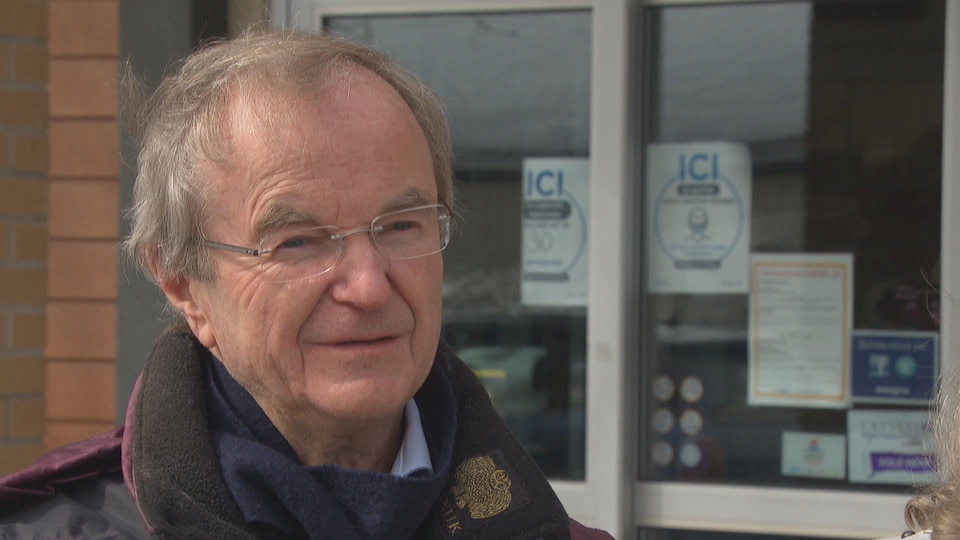These situations are part of the painful memories shared, in an interview on the show The Clevers, Dr. Mélanie Lacasse, who worked in the COVID unit of CHSLDResidential and long-term care center de la Vallée-de-la-Lièvre and the nurse clinician at Hôpital Montfort, Caroline Dufour.
We used the technological means, the tablet, while the man or the lady was dying. The person on the other end is grieving in a way you can’t imagine
, said Dr. Lacasse on Saturday.
It then referred, more specifically, to the measures that were put in place after a coronavirus outbreak CHSLDResidential and long-term care center located in Gatineau.
Dr. Mélanie Lacasse works at the Coop santé clinic in Basse-Lièvre, in Gatineau, and worked in the COVID unit of the CHSLD de la Vallée-de-la-Lièvre.
Photo: Radio-Canada screenshot
—
She said healthcare workers are not prepared to experience such situations during their training.
Even our students, our interns that we currently have – no matter what field of health they are in – they are not prepared for that.
, she said with emotion.
COVID-19 has literally changed the way we work in the health sector, said Ms. Dufour. We saw things we shouldn’t have seen. We did things that we wouldn’t normally have done that way. […] These are all pictures [et] things that will remain engraved in my memory
, testified the nurse.
Protocols have been put in place to prevent patients from dying alone. The number of people who could come to the hospital to say a final farewell to a loved one was limited. It was necessary to put in the hands of the family the choice of who will come to see the person for the last time, who will have the right to be there
, remembers Ms. Dufour.
The burden of labor shortage
Since the start of her career, Dr. Lacasse has observed the lack of manpower on the floor and according to her, the pandemic has only made this problem worse.
“On the one hand, I can’t blame people for saying ‘Me […] I’m changing jobs “because it’s not better if we kill ourselves at the job », She explained
Nurse Caroline Dufour has changed her workplace over the past year, moving from the Gatineau Hospital to the Montfort Hospital in Ottawa.
I love what I do, but I remember when the ministerial decree arrived in the Outaouais. My work schedule had to change and I had no control over anything. I could work all shifts and full time by force
, she related.
I found it really difficult […] with, already, the overtime, the stress and the lack of personnel
, she added, her throat tight with emotion.
I was really angry because the government tells us that we are heroes and guardian angels, and on the other hand, we are being beaten up by forcing us to work more. For me, it just didn’t work together.
Another reality that healthcare workers have had to contend with is the possibility of contracting the disease in the workplace.
Of course we still have a fear
, admitted Martin Lacasse, the father of Mélanie Lacasse. The 70-year-old is also a general practitioner. If he is in an age group at risk of developing complications from COVID-19, he points out that he is working in cold zone
by working at the Coop Santé Basse-Lièvre clinic in Gatineau.
We take precautions. We triage patients so that those who are feverish or who may have COVID-19 can be treated elsewhere. In the clinic, we also take a lot of precautions with masks, protective glasses, plexiglass
, he said.

Dr. Martin Lacasse, general practitioner at the Coop Santé Basse-Lièvre clinic, in Gatineau
Photo: Radio-Canada screenshot
—
Respect sanitary measures
Health care workers who spoke to ICI Ottawa-Gatineau on Saturday all had the same message to the public. As a second year of the pandemic begins, they implore everyone to respect health measures and to get vaccinated when possible.
I’ll be honest. I don’t like it to tell someone they’re going to die, let alone their family [qui] unfortunately can not come […] and that ultimately it is the members of the team who are at the bedside of this patient to stroke his hair
, launched Dr. Mélanie Lacasse, her voice broken by sobs.
With information from Ismaël Sy
–


